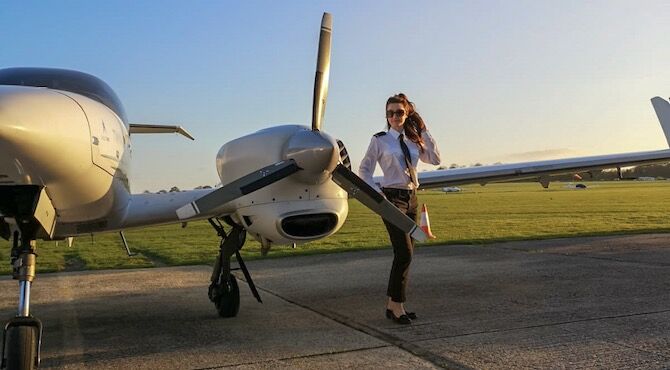Why anyone can become an airline pilot
Carrie Clark is a young woman bucking the trend by training to become an airline pilot. She explains why anyone can realise their dream with a lot of perseverance and hard work.

The realities of airline pilot training
Even when I was young, I knew it wasn’t going to be easy to become a pilot. If I’m honest, as a child/teenager I thought the hardest part would be the training! That being said, the training has been incredibly tough, too. I can assure you that training to become an airline pilot should make business travellers and holidaymakers alike feel safe. It is stringent and it is definitely designed to test your resilience.In laymen terms, here’s a very brief outline of what you need to do to become an airline pilot:To apply for an airline pilot job you must hold an fATPL. This, broken down, consists of the following qualifications:- Private Pilot License
- Night Rating
- 14 ATPL Ground Exams
- Multi Engine Rating
- Commercial Pilots License
- Instrument Rating
- Multi Crew Cooperation Certificate
Read more about how Carrie is working to become an airline pilot
Feedback from pilots
When I was contemplating how to write a piece on becoming a pilot, I realised I wanted to keep it succinct, but still full of emotion. I thought the best way to do this would be to ask some of my pilot friends how they would describe the various stages of training.Private Pilot License
“Your first solo [first flight alone in the aircraft - no instructor] is a flight you will never forget. It’s the best.”14 ATPL Ground Exams
The 14 ATPL exams we have to sit in the UK have been likened to a university degrees’ worth of information that we have to digest and test, in as little at six months. It is intense. Airlines know this and use it as reassurance that you will have the resilience and understanding to complete the training that they will require you to undertake, on the acceptance of a job offer.“The hardest thing I’ve ever done! It was horrendous but getting to get back in the aircraft after, it was worth it.” “I remember sitting in Gatwick, [The Civil Aviation Authority test centre] trying to remember five exams worth of stuff each time and wondering how I was ever going to do it. But I did.”Instrument Rating
“It’s a rollercoaster, there’s so much to learn. It is essentially learning to fly in bad weather, i.e. fog and so you are using instruments to guide you. Your capacity increases a lot during training and being able to prioritise and multi-task during flight is crucial. My favourite part would be going in the airways [defined routes for commercial traffic] and hearing easyJet and Ryanair on the radios... and then me.”Dream big and work hard
In an ideal world, I would like there to be financial support for aviation like there is for many other career options, but if I can simply make a difference by showing people that if they dare to dream, work hard, keep going and keep going some more, they will make their dream a reality, I will be happy! Our economic background, gender, place of birth or anything else should not determine whether a career is open to us or not. If you work for it, you can do it.My journey thus far has been incredibly hard, but so fulfilling and I want to help as many people as I can – in whatever way I can – to make their dream a reality too!You can hear Carrie's inspirational story at Relocate’s Think Women lunch on Friday 6 March, where we will discuss how inclusion, leadership development and education can promote more opportunities globally for women and girls. Come and share your ideas on how to support girls and young women embarking on international careers and shaping the future. Book today and help make a difference.

Subscribe to Relocate Extra, our monthly newsletter, to get all the latest international assignments and global mobility news.Relocate’s new Global Mobility Toolkit provides free information, practical advice and support for HR, global mobility managers and global teams operating overseas.
 Access hundreds of global services and suppliers in our Online Directory
Access hundreds of global services and suppliers in our Online Directory
©2025 Re:locate magazine, published by Profile Locations, Spray Hill, Hastings Road, Lamberhurst, Kent TN3 8JB. All rights reserved. This publication (or any part thereof) may not be reproduced in any form without the prior written permission of Profile Locations. Profile Locations accepts no liability for the accuracy of the contents or any opinions expressed herein.





































